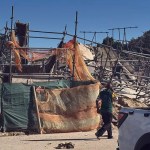Climate change is the kind of issue that humanity least likes to confront. The crisis itself is complicated and the proposed solutions are a daunting combination of expensive, inconvenient and long-term.
When a problem is so inconceivably colossal, it can often not seem real. That is, until it does. And climate change has become real. Its effects are here.
Just ask anyone who happened to be in Italy last week. After weeks of gale-force winds and infernal heat above 45°C, countless wildfires in the south decimated hundreds of square kilometres. Thousands were evacuated.
In the north, the situation was quite different. Charon, the anticyclone weather pattern from the Sahara, flipped weather systems. Milan – a city usually steamy and stagnant in July – was hit by torrential rain and a cyclone of the sort one usually sees in films set in the American Midwest. Thousands of trees were uprooted, crushing parked cars. Power and transport infrastructure was shredded.
Hailstones the size of footballs fell in the northeast around Brescia and Veneto, destroying not just cars, but also buildings. A 16-year-old girl on a school camp was killed. In Alto Adige, ancient bridges and villages were washed away.
As the climate change denialist naysayers are always fond of pointing out, none of this is essentially unprecedented.
Every summer, Sicily battles fires. Rome is always hot in July, and in fact was once hotter back in the 1980s or so. Milan had actually experienced something like a cyclone before, in the late 1990s. But what made it unprecedented was that it was happening all at once.
Usually, the reaction to such events is theoretical and philosophical. We tend to muse on the nightmarish vision of what the future has in store. That is true, and we should not ignore it. But this is not just theoretical.
Italian civil protection minister Nello Musumeci said, “This is one of the most complicated times facing the country for decades”, given the confluence of logistical challenges created by floods, tornadoes, hailstones, torrid heat and devastating fires, all simultaneously in one country.
Climate change has long since ceased to be merely a theoretical, or philosophical construct. Now the challenge is more mundane, but far more terrifying – it is logistical, practical and very real.
Humanity as a species is not good at adapting to change.
Rather, we recalibrate our expectations of normality and move on, treating the new context as normal. This is one of the reasons we have been so superlatively successful as a species, in terms of breeding and surviving.
If that hadn’t been the case, would any migratory group of humans arriving in a foreign place – be it cold, hot or full of bellicose residents – have bothered to stay? But this attribute; this irrational determination to go on as before despite the warning signs of climate change, will surely be the seed of our demise. Around now, frogs in slowly warming pots of water are usually mentioned.
As an example of this irrationality, Phoenix, Arizona – where maximum temperatures have exceeded 40°C for 26 successive days – is for some reason America’s fastest-growing big city. Supposedly, new residents there simply go about their lives as before, just with more air-conditioning and less time outside. Sadly, however, when looking at the statistics, for a growing number of people life does not go on at all.
As John Burn-Murdoch writes in the Financial Times, between 1970 and 1990, an average of 16 people a year died from “exposure to excessive natural heat” in Arizona. Between 1990 and 2015, the average rose to 38. In 2020 it was 210, and in 2022 the death toll came in at 257.
It seems there are two main reasons for such irrational behaviour as moving to Phoenix.
First, most discussions about climate change continue to emphasise the risk of much worse things in the unknowable future. This is understandable, but an almost permanent focus on the future can blind us to what is happening right now, and we just go on with life as normal.
Politicians are presenting this incorrectly. We should not be emphasising abstract statistics, but what is actually happening right now. The focus on the 2°C limit is understandable, but it is problematic. It sounds small, refers to some unknowable date in the future, misrepresents what is actually happening to global temperatures, and lacks any connection to human experience.
Second, this is a global problem which needs global solutions. But in such a fragile, unstable and fragmented geopolitical context, compelling and convincing global leadership is absent.
All this makes another human instinct come to the fore: individualistic self-preservation.
If the collective cannot solve the problems on a systemic level, it becomes rational to do so for oneself and one’s loved ones. Moving somewhere far from the coast, at a relatively cool, high altitude, protected against floods and landslides, with access to abundant water and local food production, and far from any potential socioeconomic unrest, is probably a good place to start. DM
To read all about Daily Maverick’s recent The Gathering: Earth Edition, click here.


















 Become an Insider
Become an Insider
Comments - Please login in order to comment.